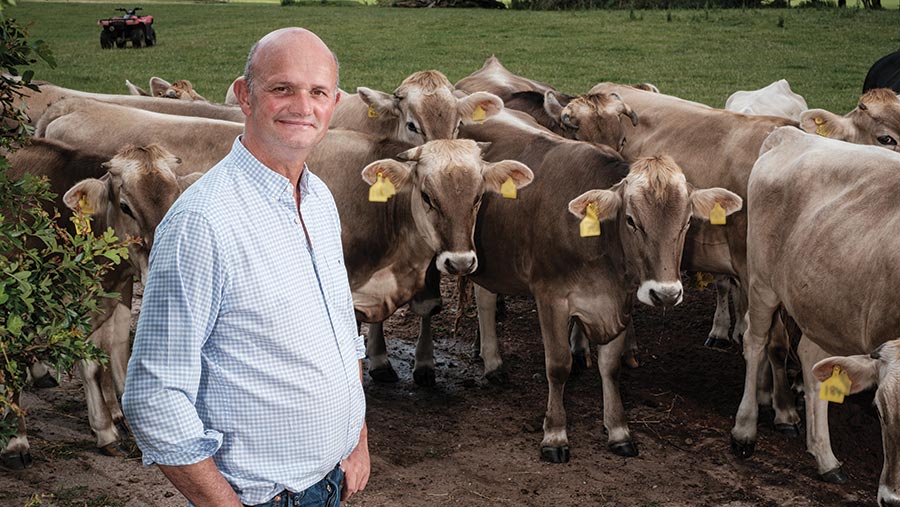Defra removes pro-cull farmer from Bovine TB Partnership
 Philip Latham © Jim Varney
Philip Latham © Jim Varney Defra has downsized the number of board members on its Bovine TB Partnership, but maintains it still has a good balance of interests from across the farming industry.
Cheshire dairy farmer Phil Latham and Devon farm vet Dick Sibley have been told their membership on the board will not be extended. Meanwhile, Prof Rosie Hall, nature and science director at the National Trust, has resigned.
Mr Latham, an outspoken supporter of badger culling to tackle bovine TB, said he found out by a phone call and an email that Defra had chosen not to extend his three-year term on the board for the coming 12 months.
See also: Is England on track for a healthy cattle herd and TB-free future?
“It’s been an absolute privilege to have been in the TB Partnership and I wish it well going forward,” Mr Latham told Farmers Weekly.
But he added: “I feel the partnership struggles though, because it is thin-skinned politicians – whether that’s Welsh politicians or Westminster politicians – who actually are making TB policy.
“They’re not listening to the evidence, and they are making entirely political choices. This is the problem with TB governance; what we’re always struggling with as farmers is the governance model.”
Science-based policy ‘critical’
Mr Latham said farmers must continue to have a voice in the governance model, and it is “absolutely critical” TB policy must be a science-based.
But he warned the government’s decision to phase out badger culling in England before a viable alternative can be found will only see TB rates rising again.
“The only thing we’ve done that has had an impact on TB is a population density reduction exercise in badgers in the endemic area under licence,” Mr Latham insisted. “Unless we keep the population down, we will return to where we were.”
Mr Latham believes a cattle vaccine for commercial use and the associated Diva diagnostic test will not be ready in 2025 – and possibly not until at least 2028.
Defra is exploring the concept of an “epi-culling” policy, which would allow ministers to intervene and remove badgers in areas of England where a cluster of new TB herd breakdowns are linked to disease transmission in wildlife.
Mr Latham understands Defra wants to keep culling to a minimum, but asks: “What hope is there for my own county, Cheshire, where the Apha epi reports attribute 65% of herd breakdowns to badgers?”
No South West voice
Mr Sibley expressed frustration that Defra had chosen not to extend his board membership, meaning there is no longer a representative from the South West, which has a third of all TB outbreaks.
Without better TB testing tools, Mr Sibley believes Defra has “no chance” of eradicating TB in England by 2038. He said his request to Defra ministers to invest a further £15m in better testing each year was overlooked.
“I think that badger culling has done some good, but we cannot afford to lose that momentum,” he said. “We cannot ignore the other half of the equation, which is the residual infection in the cow population.”
Defra launched the Bovine TB Partnership in February 2021 as a replacement for the Bovine TB Eradication Advisory Group for England (TBEAG) to improve co-ordination and shared ownership of policy, as recommended by the Godfray Review.
The partnership, which is chaired by John Cross, make recommendations to government on TB policy. But ultimately, ministers are tasked with making the decisions.
Bovine TB Partnership composition
Defra says 20 members have been reappointed for a further 12 months, and it does not intend to recruit additional members at this point.
All members’ terms and conditions state that there is no guarantee of reappointment beyond the original three-year term.
A Defra spokesperson said: “Bovine TB is one of the most difficult and intractable animal health challenges the livestock sector in England faces today, causing considerable trauma for farmers and costing taxpayers over £100m every year.
“Badger culling will remain a part of our toolkit, and we have been clear that our approach will be informed by the science.
“Our strategy has already led to a significant reduction in this insidious disease, and building on the progress made, we are now able to move onto the next phase, including wider badger vaccination, alongside improved cattle testing and work towards deployment of a cattle vaccine.”
List of TB Partnership board members:
- John Cross – Chair, farmer
- Eleanor Brown – Deputy director bTB Programme, Defra
- Andrew Soldan – Veterinary director, Apha
- Steph Bird-Halton – Natural England
- Tom Bradshaw – NFU deputy president
- Tom Rabbetts – NFU
- James Russell – Private veterinary surgeon, BVA
- Rebecca Cavill – Private veterinary surgeon, BCVA
- Paul Westaway – Farmer, High Risk Area
- David Barton – Farmer, High Risk Area
- Chris Addison – Farmer, Low Risk Area
- Stephanie Young – Local Authority
- Professor Rosie Woodroffe – Academic
- Professor Gareth Enticott – Academic
- Dr Lindsay Heasman – Animal health consultant
- Kate Bowen – Private veterinary surgeon
- Sarah Tomlinson – Private veterinary surgeon
- Professor James Wood – Academic
- Dr Jane Gibbens – Academic
- Professor Rowland Kao – Academic
